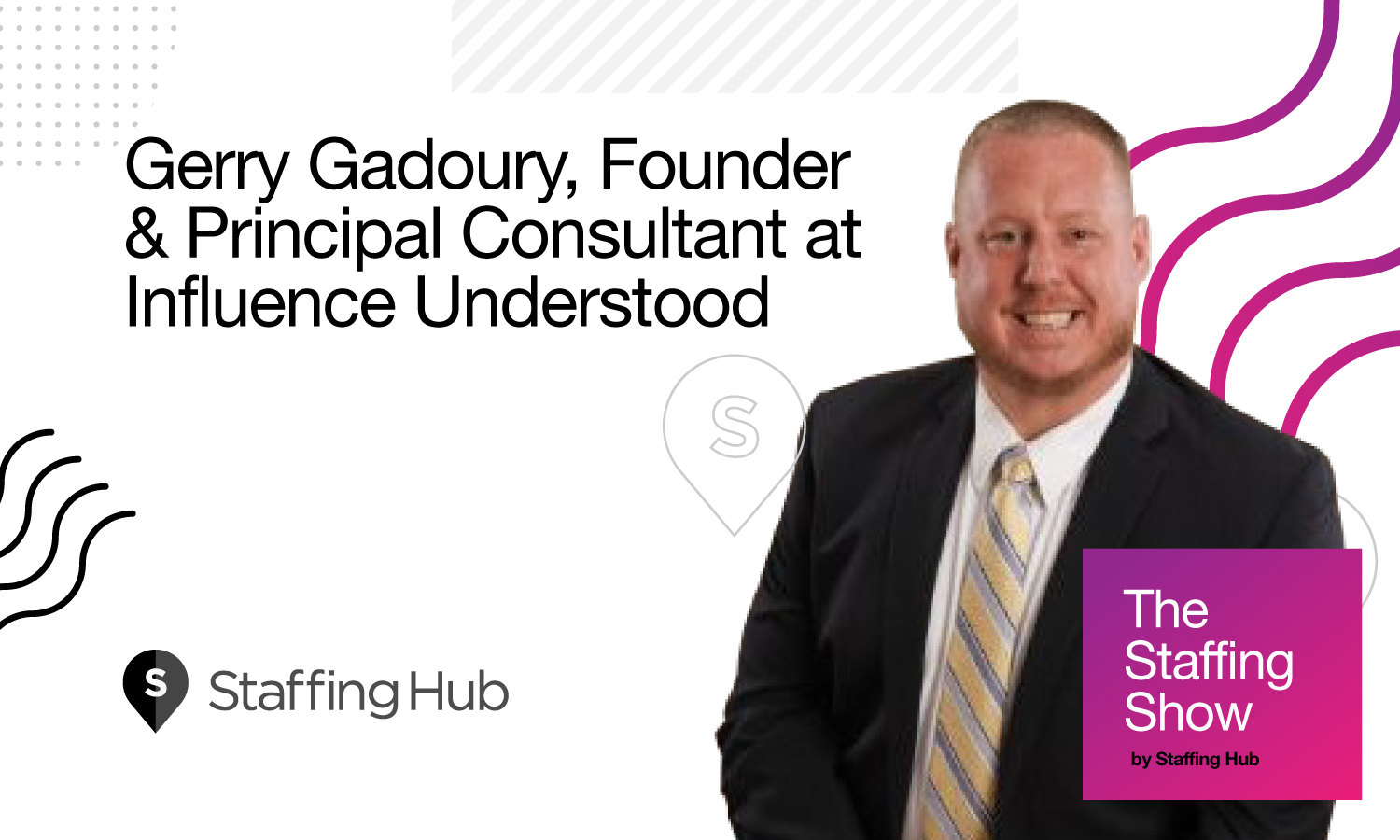
In this episode, I sat down to chat with Gerry Gadoury, the Founder & Principal Consultant at Influence Understood. Gerry spends a lot of time thinking about how poor connections causes breakdowns in the recruiting process — and what to do about it. Here, he shares his thoughts on how to recruit for stronger relationships, how to coach your sales and recruiting teams to abandon transactional thinking, and what it will really take to survive the robots.
Here’s the transcript of the episode.
Staffing Hub: I’m here talking with Gerry Gadoury today, the Founder & Principal Consultant at Influence Understood, an IT tech consulting firm. Thank you for talking to us today, Gerry. I appreciate you taking the time to join the Staffing Show Podcast.
You have a really unique perspective on sales operations and training for IT recruiting firms and I was just wondering if you could tell us a little bit about your background.
Gadoury: Sure, thank you, and thank you for having me, Caitlin. Yeah, I’ve been in our industry now for about 20 years. I started off as a technical recruiter, moved from there to technical sales, and then branch management, regional management, and consulting. I’ve been consulting for the last four and a half years and own my own firm for the last two.
Our firm specializes really in helping technology, IT, and engineering staffing and consulting firms to grow.
My experience has really been across every seat in our industry that there is, and it’s given me, I think a little bit, different view of the marketplace and what a lot of companies get the chance to achieve.
Staffing Hub: Yeah, so give me a little insight into how Influence Understood helps you do just that, take clients to the next level.
Gadoury: Sure, thanks for asking, Caitlin. Influence Understood is really geared towards, as I mentioned, IT, technology, and engineering staffing and consulting firms and helping them to grow. The way that we do that is really through one of three different approaches. Full disclosure, realistically probably a combination of the three in most instances.
I’ll work with the owners and/or senior managers to make sure that there’s alignment with the recruiting and sales teams, as well as ensuring they have a real value-based approach to the marketplace.
Also, we work on training and helping recruiting teams to grow in their relationships with their candidates and the value that they add to that marketplace.
Then the same for sales: I do a lot of sales training and helping salespeople to adopt a value-based approach to their prospect and client lists. Really again, like I said, generally a combination of those three services is what most firms want from me when I engage with them.
Staffing Hub: You mentioned in your mission statement that poor connection is something that identifies a breakdown, I think, on all of these three levels that you mentioned. Can you talk to me a little bit about what you think causes this poor connection throughout the IT recruiting process?
Gadoury: Absolutely. It really is a simple matter of human interaction.
It’s funny, when you listen to salespeople and recruiters speak, they often neglect to speak to the people that they’re interacting with in a way that would lead you to believe that they actually like them.
Recruiters and salespeople don’t speak as though they like the people that they’re interacting with.
Very often, we forget that when we’re interacting with a prospect or candidate, they’re listening to us because they have something that they want or potentially need. Very often, when I’m interacting with salespeople or recruiters, their message is very self-serving, it’s very transactional.
If there’s any part in our industry that we have to avoid like the plague, it’s a transactional mindset. The more transactional we become, the less of true value that we add. That’s what creates that breakdown in connection. We essentially rob candidates of a reason to listen.
Staffing Hub: If you were to give listeners some advice on how they might alter their internal training or the way they speak to their team, what advice would you give on how they could move recruiters away from that transactional mindset?
Gadoury: Absolutely, it’s actually a larger question than it probably seems on the surface and I could speak for hours about it. But let me give you a concise answer as I can.
Really, the number one thing is to make sure again that your team understands that your relationship is larger than the transaction.
When you’re interacting with a candidate, that candidate needs to believe that you want to see them get what’s best for them — whether it’s your opportunity or another — with the intent of working with that candidate throughout the lifetime of their career.
When you’re a salesperson dealing with a client, that client needs to believe that you not only have subject matter expertise in your space but also that you care about them beyond that individual job order.
The more that we can help our market understand those things, the more attentive they are to our message, the more inclined they are to listen.
So, when we’re training them, training can’t be — we start them on a Monday, work them through our ATS/CRM on Tuesday and Wednesday, tell them our company’s story Thursday, and put them on the phones Friday.
That type of training regimen, which I see all the time unfortunately, it’s just very unproductive.
We ask them to have a consultative sales approach but then all we do is teach them product.
Staffing Hub: What are some ways that executives might shift to that thinking, away from product to relationship?
Gadoury: That’s a great question. So it really starts with truly understanding their marketplace.
One of the first questions I ask all of my client when I start working with them is: how are you different than your competitors in your marketplace?
Almost always they give me some variation of the same answer: “We have the best candidate pipelines. We have the strongest recruiting engine.” And unfortunately, as you might imagine, if every single company gives me that answer, then that’s not a differentiator.
Every single company says that. So, even if it were true in your area, it’s not believable.
So the way that we move away from that mindset is coming to understand our audience and what value we really bring them, what legitimate value.
Let me give you a spoiler alert here, let’s skip to the end: the real value isn’t the people that we bring. Every single staffing and consulting firm in the world provides that service. That part of what we do is a commodity.
The real value that we bring is our understanding of the workforce marketplace in that area, in that skill set. And the better that we understand that, the more effective we are, both in our ability to communicate and our ability to connect.
So, first step and most important step for that executive who wants to move beyond transaction to real relationship is to truly understand their marketplace, what their marketplace wants from them, and how they can fill that void, that space.
Staffing Hub: I think a lot about the tools that firms choose, that facilitate relationships over facilitating a more transactional experience. I was wondering what types of tools you see your clients use that have been differentiators for supporting relationship-building in their firms.
Gadoury: That’s a great question, Caitlin. So it’s interesting. When I first started off selling so many moons ago, we did no pre-call research. This is pre-LinkedIn, pre- any of those tools, so we did no pre-call research, we called people, at best we knew their title, and because of that we put out a huge volume of calls, 100, 125 dials a day. And of that we could expect 20 or 25 connects where a live person picked up the phone, we had an opportunity to interact.
In those days because of those numbers, doing what I now call a “garbage call” really didn’t matter because even if only 5% of the people we spoke to, we had an opportunity to connect, that was still meaningful conversations that happened every day.
Companies that still use a cold-call-first approach are discovering that that 1 in 5 connection rate I just described, has grown to 1 in 35, 1 in 40 in some areas, and there’s no way to make that map work.
Now, I’m not calling the cold call dead, cold outreach will always be a part of our business, but it can’t be the only part.
The tools that I see that really make a big difference are tools that help salespeople and recruiters to do some research and to automate the parts of their workflow that don’t impact the relationship.
The more time that we can free our recruiters and salespeople up to actually be candidate- and client-facing, the more opportunities they have to succeed. The tools that are powerful and the sections or segments of the marketplace that the tools inhabit that help us most are things again that automated the low-value activities of salespeople and recruiters, freeing them up to be more candidate and client facing.
Staffing Hub: Do you think that some of these breakdowns in communication or really in thinking about the recruiting process as a whole, are unique to, IT-recruiting specifically, or do you think these are larger problems overall?
Gadoury: The overwhelming majority of my business is IT, technology, engineering and scientific staffing consulting firms, but I do interact with finance firms. I do interact with admin/clerical/light industrial. And while their outreaches and strategies are certainly a little bit different, I would argue that really there are two types of companies in the marketplace today.
One of them is the type of company that focuses on larger businesses: MSP/VMS. They have to do everything in their power to automate as many steps as possible because their profit margins are so much smaller, the amount of volume required is so much higher. The only way they can make money, and again they can make significant money if they do this right, is to automate as much as that as possible. For those companies, the transactional business that I’m talking about really is something of a necessity.
But, for companies that are really focusing on accounts where they have the opportunity — and again, this is regardless of whether it’s technology or something else — but the type of accounts where they can interact with individuals, for them if they allow themselves to lose that relationship piece, then they’re robbing their market of a reason to interact with them.
Now in either model on the recruiter side of the equation, it’s critical that they have that relationship. Once again on the MSP/VMS larger-account-focus companies, there will be admittedly less time for that, but still some level of connection needs to occur.
In any firm regardless of their specialty or their niche, if they’re focused on contract staffing, their goal should be to develop candidate pipelines that allow them to place that same candidate again, and again, and again.
The only reason that happens in a candidate-driven market like we find ourselves in today, is if we give that candidate a reason to want to work with us. Does that make sense, Caitlin?
Staffing Hub: Definitely. I was wondering what do some of those reasons look like or how can firms convey that they really understand the candidate on a career-long lifecycle as opposed to a transactional one-off life cycle?
Gadoury: Absolutely. It’s not as complicated as it may seem.
The first thing, once again, is to understand their audience. So, what drives a candidate in the marketplace?
Regardless again of what their specialty and their job type is, they want to achieve career growth.
So, what does career growth look like for that candidate? Where are they in their career? What would make sense for them as a next step and what are they looking to achieve? So, as our recruiters take the time to ask those questions that give those answers, a picture will emerge.
In addition to that, understanding where that candidate is in their job search cycle at that particular moment in time is also relevant. So, as we’re sharing our opportunities with our candidates, we want to ensure that, #1 our opportunity makes sense, and #2, that it compares favorably to any other opportunities that candidates are reviewing at that time.
Again, we’re in a fully candidate-driven market now, for technology especially. Every single market I work is fully, statistically, it’s fully employed. Every decent candidate has multiple opportunities, so we want to make sure that we’re on track.
If we are, then of course we want to push our opportunity, that’s what we’re there for. But if we’re not, we need to make sure that that candidate understands, “Hey, I wish you the best luck. Clearly our opportunities didn’t match this time.”
Take a moment to learn a little bit more about them and see if you can get a referral for another candidate.
Said differently, if a candidate rules themselves out for a specific position, and they’re an otherwise good candidate — the type of person that we place again and again — we want to include them in our pipeline.
So, really the way that we do what you achieve is simply as it’s always been since sales begin as the second oldest profession, asking questions.
Staffing Hub: That’s great. How do you think the industry will change in the next few years?
Gadoury: I think there’s some really strong divergence points coming up.
Between machine learning, artificial intelligence, and blockchain, the way information is being disseminated is changing radically.
For companies that operate on a more transactional basis, as I alluded to earlier, it’s imperative that they do everything they can to automate everything that they can because those profit margins are gonna continue to dwindle. The reason they’re gonna continue to dwindle is because firms will offer less and less real value in the marketplace.
If every candidate is a member of a blockchain that accessible to an end client, again, a firm provides less and less value. Now before that sounds too much like how the job boards were gonna end staffing 15 years ago, this really is different because people won’t be trapped in pools that are controlled by specific job boards that information will be much more readily accessible.
For companies that operate on a more relationship focused basis like I described so far, for them the key is to maintain that relationship at all costs.
Not suggesting that they write no-profit business or anything like that.
But, I am saying that the stronger that firms maintain relationships in candidate pools and the stronger that they maintain relationships with clients, the more actual real usable information they’ll have, the more value they’ll provide for their marketplace.
The more value companies provide, the safer and more secure they are.
Staffing Hub: Yeah, that’s perfect. Thank you so much.
Gadoury: Thank you.
Staffing Hub: Yeah. That was fantastic. I think you gave us a wonderful bird’s eye view of the industry and a lot of tactical ways to honor those relationships in the industry, so I really appreciate it.
Gadoury: Awesome. I’m glad I could help.





